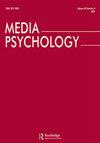电视屏幕上的帮助和伤害:有限的广义互惠和跨种族群体期望
IF 2.6
2区 心理学
Q1 COMMUNICATION
引用次数: 2
摘要
抽象两个调查研究,一个拥有大学样本(研究1,n = 245)和一个与美国全国成人样本(研究2 n = 590)检查媒体信息如何影响态度在美国黑人小说的贡献的角色是有界广义互惠,或相信外围集团的成员可能会返回一个忙(积极的),或制定惩罚错误的(消极的)因素电视使用和态度之间的关系。研究1(大学生样本)发现终身看电视与消极态度之间的关系是由消极互惠信念介导的。研究2(美国成人样本)发现了矛盾心理效应的支持,即终身看电视与积极和消极互惠信念的增加有关。这表明互惠信念可以像其他类型的信念(例如,犯罪频率,卑鄙的世界)一样被培养,并且这些信念与种族态度有下游关系。他们受电视使用影响的方向仍然是一个悬而未决的问题,可能取决于电视内容的模式。本文章由计算机程序翻译,如有差异,请以英文原文为准。
Helping and Hurting on the TV Screen: Bounded Generalized Reciprocity and Interracial Group Expectations
ABSTRACT Two survey studies, one with a college sample (Study 1, n = 245) and one with a national U.S. adult sample (Study 2, n = 590) examined how media messages can influence attitudes toward Black people in the U.S. A novel contribution is the role of Bounded Generalized Reciprocity, or the belief that members of an outgroup are likely to return a favor (positive), or enact retribution for a wrong (negative) as a factor in the relationship between television use and attitudes. Study 1 (college student sample) found support for a relationship between lifetime television exposure and negative attitudes, mediated by negative reciprocity beliefs. Study 2 (U.S. adult sample) found support for an ambivalence effect, where lifetime television exposure was associated with increases in both positive and negative reciprocity beliefs. This indicates that reciprocity beliefs can be cultivated similarly to other kinds of beliefs (e.g., crime frequency, mean world), and that these beliefs have downstream relationships with racial attitudes. The direction in which they are influenced by television use remains an open question, and likely depends on TV content patterns over time.
求助全文
通过发布文献求助,成功后即可免费获取论文全文。
去求助
来源期刊

Media Psychology
Multiple-
CiteScore
8.60
自引率
7.10%
发文量
30
期刊介绍:
Media Psychology is an interdisciplinary journal devoted to publishing theoretically-oriented empirical research that is at the intersection of psychology and media communication. These topics include media uses, processes, and effects. Such research is already well represented in mainstream journals in psychology and communication, but its publication is dispersed across many sources. Therefore, scholars working on common issues and problems in various disciplines often cannot fully utilize the contributions of kindred spirits in cognate disciplines.
 求助内容:
求助内容: 应助结果提醒方式:
应助结果提醒方式:


